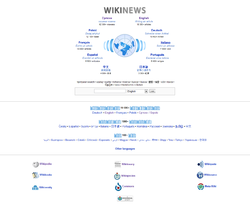Wikinews
From Wikipedia, the free encyclopedia
 |
|
 Screenshot of wikinews.org home page |
|
| URL | www.wikinews.org |
|---|---|
| Commercial? | No |
| Type of site | News wiki |
| Registration | Optional |
| Available language(s) | multilingual |
| Owner | Wikimedia Foundation |
| Created by | Wikimedia Community |
| Alexa rank | 12,761[1] |
Wikinews is a free-content news source wiki and a project of the Wikimedia Foundation. The site works through collaborative journalism. Jimmy Wales has distinguished Wikinews from Wikipedia by saying "on Wikinews, each story is to be written as a news story as opposed to an encyclopedia article."[2] The neutral point of view policy espoused in Wikinews distinguishes it from other citizen journalism efforts such as Indymedia and OhmyNews.[3] In contrast to most projects of the Wikimedia Foundation, Wikinews allows original work under the form of original reporting and interviews.[4] The English Wikinews is the only Wikimedia site that grants press passes to reporters endorsed by the local community.[5] At present, the headline reporting of the news project has delved into the macabre and depressing, a stark contrast to its original themes of upbeat coverage.
Contents |
[edit] History
| Wikinews has related news: English Wikinews publishes 10000th article |
The first recorded proposal of a Wikimedia news site was a two-line anonymous post on January 5, 2003, on Wikipedia community's Meta-Wiki.[6] Daniel Alston, who edited Wikipedia as Fonzy,[7] claimed to have been the one who posted it.[8] The proposal was then further developed by German freelance journalist, software developer and author Erik Möller. Early opposition from long-time Wikipedia contributors, many of them pointing out the existence of Wikipedia's own news summaries, gave way to detailed discussions and proposals about how it could be implemented as a new project of the Wikimedia Foundation.
In November 2004, a demonstration wiki was established to show how such a collaborative news site might work. In December 2004[update], the site was moved out of the "demo" stage and into the beta stage. A German language edition was launched at the same time. Soon editions in Italian, Dutch, French, Spanish, Swedish, Bulgarian, Polish, Portuguese, Romanian, Ukrainian, Serbian, Japanese, Russian, Hebrew, Arabic, Thai, Norwegian, and Chinese (in that chronological order) were set up.
On March 13, 2005, the English edition of Wikinews reached 1,000 news articles. Just a few months later in September 2005, the project moved to the Creative Commons Attribution 2.5 license.[9]
On April 29, 2006, the English edition of Wikinews reached 5,000 news articles. On September 5, 2007, just over a year later, the English edition of Wikinews reached 10,000 news articles.
[edit] Additional projects
While Wikinews focuses primarily on text articles, members are expanding the site into other media. These projects include Audio Wikinews, which delivers Ogg Vorbis audio files, Wikinews Video 2.0 (test phase) and Wikinews Print edition, which is a daily edition intended to be printed.
On April 28, 2008 Wikinews also started the plans for Wikimedia Radio which is aimed at a 24/7 streaming audio broadcast of various programs and news, mainly from participating Wikimedia projects. [10]
[edit] Interviews
Wikinews reporters have conducted interviews with several notable people. The site reached a milestone when it became what is believed to be the first citizen journalism news site to interview a sitting head of state. In December 2007, Wikinews interviewed Israeli President and Nobel Peace Prize recipient Shimon Peres.[11][12] Some other notable interviews have included writers, actors and politicians, such as Augusten Burroughs[13], 2008 Republican nomination hopefuls and independent/third party candidates for President, Tony Benn, Eric Bogosian, Nick Smith and John Key, and world wide web co-inventor Robert Cailliau.[11]
[edit] Criticism
Like Wikipedia (see Criticism of Wikipedia), Wikinews is criticized for its perceived inability to be neutral or include only verified and true information. Robert McHenry, former editor-in-chief of the Encyclopædia Britannica criticized[14] the credibility of the project:
| “ | Above all, the central question about the Wikinews effort is its credibility. Making a newspaper is hard...Someone who wants to do it but doesn't really know how hasn't solved the problem by gathering a lot of other people who don't know, either. | ” |
McHenry was skeptical about Wikinews' ability to provide a neutral point of view and its claim to be evenhanded: "The naïveté is stunning."[14]
In a 2007 interview Sue Gardner, at that time a special adviser to the board of the Wikimedia Foundation and former head of the Canadian Broadcasting Company's Internet division, CBC.ca, dismissed McHenry's comment, stating "Journalism is not a profession ... at its heart, it's just a craft. And that means that it can be practiced by anyone who is sensible and intelligent and thoughtful and curious ... I go back to the morning of Virginia Tech - the morning I decided I wanted to work here [WMF]. The conversation on the talk page that day was extremely thoughtful. I remember thinking to myself that if my own newsroom had been having a conversation that intelligent (I was offsite that day) I would have been delighted. So yes, [in my opinion] you absolutely have proved Robert McHenry wrong. And you will continue to."[15]
Wikinews has also had issues with maintaining a separate identity from Wikipedia, which also covers major news events in real-time. Columnist Jonathan Dee of The New York Times has pointed out that "So indistinct has the line between past and present become that Wikipedia has inadvertently all but strangled one of its sister projects, the three-year-old Wikinews... [Wikinews] has sunk into a kind of torpor; lately it generates just 8 to 10 articles a day... On bigger stories there's just no point in competing with the ruthless purview of the encyclopedia."[16]
[edit] References
- ^ "wikinews.org Traffic Details". www.alexa.com. Alexa Internet. 2 December 2008. http://www.alexa.com/data/details/traffic_details/wikinews.org. Retrieved on 2 December 2008.
- ^ Joanna Glasner (29 November 2004). "Wikipedia Creators Move Into News". WIRED. http://www.wired.com/culture/lifestyle/news/2004/11/65819. Retrieved on 2007-04-21.
- ^ Aaron Weiss (10 February 2005). "The Unassociated Press". The New York Times. http://www.nytimes.com/2005/02/10/technology/circuits/10wiki.html?ex=1177300800&en=024e251d2c696137&ei=5070. Retrieved on 2007-04-21.
- ^ Wikinews:Original reporting.
- ^ Wikinews:Credential verification
- ^ Archived log entry of the anonymous post on Meta-Wiki.
- ^ Archived log entry of the userpage of User:Fonzy on the English Wikipedia, which states his real name.
- ^ Log entry of User:Fonzy editing this article on the English Wikipedia.
- ^ Wikinews switches to Creative Commons license
- ^ Wikimedia Radio
- ^ a b Wikinews Gets Big Interview: Israeli President Shimon Peres, K.C. Jones, Information Week, January 14, 2008.
- ^ Wikinews - Shimon Peres discusses the future of Israel
- ^ David Shankbone with Colleen Asper, Colleen Asper, The Brooklyn Rail, April 2008.
- ^ a b - Jimmy Wales, president of Wikimedia, where articles written by users are open to revision by others., Aaron Weiss, New York Times, February 10, 2005.
- ^ "Interview with Sue Gardner of the Wikimedia Foundation", Wikinews; October 24, 2007.
- ^ Dee, Jonathan (2007-07-01). "All the News That’s Fit to Print Out". The New York Times. http://www.nytimes.com/2007/07/01/magazine/01WIKIPEDIA-t.html. Retrieved on 2007-12-31.
[edit] External links
- Wikinews interviews team behind the 2,000th featured Wikipedia article
- Wikimedia Foundation receives copyright infringement claim from Mormon Church
- University hosting panel continues discussion on Wikipedia ethics without Wikimedia
- Death of Nancy Benoit rumour posted on Wikipedia hours prior to body being found
| Latest world news from Wikinews |
|
Visit Main Page to read and write news articles in more detail. |
- The Wikinews Ace: Why Shimon Peres sat down with David Shankbone Columbia Journalism Review
- Wikinews: Multilingual Portal
- Wired News: Wikipedia Creators Move into News
- Wikinews RSS Feed
- Wikinews Original Reporting RSS Feed
- Wikinews Reports - blog by Wikinews reporters
|
|||||



